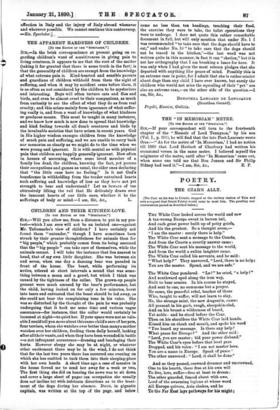CHILDREN AND THEIR KITCHEN-LOVE.
(To THE EDITOR Or THE "SPECTATOR."] SIR,—Will you allow me, from a distance, to put in my pro- test—which I am sure will not be an isolated one—against Mr. Tollemache's view of children ? I have certainly not found them " untender," though I have sometimes been struck by their greater thoughtfulness for animals than for "big people," which probably comes from its being assumed that the " big people " can take care of themselves, while the animals cannot. I will take the instance that lies nearest to hand, that of my own little daughter. She was between six and seven, when one day a dancmg bear was paraded in front of the house. The beast, while performing its antics, uttered at short intervals a sound that was some- thing between a moan and a growl, but which I think was caused by the tightness of the collar. The grown-up people present were much amused by the bear's performance, but the child, having looked on for only a few minutes, burst into tears and entreated that the beast should be led away, as she could not bear the complaining tone in his voice. She was so disturbed by the thought of the pain he was probably undergoing that it took me some time and various vague assurances—for instance, that the collar would certainly be loosened at night—to quiet her. If your space were not so vain- able I couldtell you more about this same child's care of her pets, four terriers, whom she watches over better than many a mother watches over her children, feeding them daily herself, looking after all their wants, and when they have been wounded in battle —a not infrequent occurrence—dressing and bandaging their hurts. However sleepy she may be at night, or whatever other excitement there may be in the wind, I do not think that for the last two years there has occurred one evening on which she has omitted to tuck them into their sleeping-place with her own hands. A short time ago a case of measles in the house forced me to send her away for a week or two. The first thing she did on hearing the news was to sit down and cover a large sheet of paper (an occupation she usually does not incline to) with intricate directions as to the treat- ment of the dogs during her absence. DOGS, in gigantic capitals, was written at the top of the page, and below came no less than ten headings, touching their food, the exercise they were to take, the toilet operations they were to undergo. I dare not quote this rather remarkable document in full, but will only mention that under No. 1 I was recommended " to take care that the dogs should have to eat," and under No. 10 " to take care that the doge should not be teased in the kitchen,"—the last word was not written quite in this manner, in fact it ran " chetion," but it is not her orthography that I am breaking a lance for here. It was only when I had given the moat solemn pledges that she departed with anything like peace of mind. Possibly this is an extreme case in point, for I admit that she is rather crazier about dogs than any child I have ever known, but surely the children who would not miss the squealing of their " pet " are also an extreme case,—on the other side of the question.—I am, Sir, 8a3.,
DOROTHEA LONGARD DE LONGGARDE (Dorothea Gerard). Pryski, Kassow, Galicia.


































 Previous page
Previous page